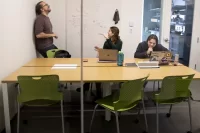
Mathematical modeling, cancer treatment linked in Bates lecture
Lisette de Pillis, an expert in the use of mathematical models to solve difficult problems in diverse fields, offers two lectures on Oct. 13. A professor of mathematics at Harvey Mudd College, she gives an informal talk titled Cancer Growth and Treatment Modeling at 4:30 p.m. At 8 p.m., she gives a lecture titled How to Model Cancer Growth and New Treatment Strategies: A Perspective of Cooperation. The location for both is the Keck Classroom (Room G52), Pettengill Hall. A reception follows the evening talk.
The talks are open to the public at no cost.
De Pillis appears at Bates as part of an annual lecture series honoring the late Richard W. Sampson, professor emeritus of mathematics at Bates. The events are sponsored by the Bates mathematics department and are open to the public at no cost. For more information, please call 207-786-6237.
De Pillis has engaged in research in a broad range of areas, from modeling cancer tumor growth, immune system interactions and treatment protocols to analyzing social themes in language. The common thread in her work is the use of sophisticated mathematical modeling and computational techniques to obtain solutions to otherwise intractable problems. She is currently funded by the National Science Foundation to continue her work in developing models to help predict ideal treatment protocols for cancer patients.
De Pillis is also interested in parallel computing, which splits a given computing process into multiple operations that are handled simultaneously by parallel systems in one machine. She supervised the development and construction of a “Beowulf” computer at Mudd that uses parallel architecture and off-the-shelf components to achieve extremely fast processing at a reasonable cost. Thanks to her efforts, Mudd was the first undergraduate college to have such a system.
In addition to cancer research, de Pillis has published in the areas of fluid dynamics, computational linear algebra, dynamics of periodic structures in engineering applications, parallel algorithms applications and long-term effects of state funding fluctuations on universities. She has fostered interdisciplinary research through organizing conferences in mathematical biology, and has lectured throughout the country and internationally.



